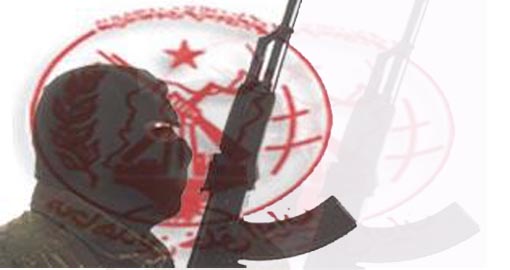Donald Trump’s rumored picks for key foreign-policy positions have already set off alarm bells about the future administration’s embrace of war hawks and Islamophobes. Today, Washington Post columnist Josh Rogin 
Giuliani isn’t the only likely member of the future administration to have maintained close ties and advocated on behalf of the former terrorist group, which assassinated six Americans in Iran between 1973 and 1976.
John Bolton (another rumored choice for secretary of state), Clare Lopez (who is reportedly short-listed for deputy national security adviser), and Newt Gingrich (who allegedly turned down an offer of secretary of state but has shown interest in serving as a policy adviser in the Trump administration) have all advocated for the former terrorist group and praised its cultish leader, Maryam Rajavi.
Shortly after the overthrow of the Shah, the group experienced a falling out with Ayatollah Ruhollah Khomeini and fled into exile. Over the following years, the group’s leaders, Maryam and Massoud Rajavi, aligned with Saddam Hussein during the Iran-Iraq war (7,000 members fought alongside Saddam Hussein, against Iran) and shifted toward increasingly cultish behavior, mandating divorces and celibacy for their soldiers while cultivating a cult of personality around themselves.
Massoud Rajavi hasn’t been seen since overseeing the surrender of MEK forces to the U.S. following the 2003 invasion of Iraq. This summer, the former head of Saudi Arabia’s intelligence agency, Prince Turki bin Faisal Al Saud referred to Massoud Rajavi as “the late Massoud Rajavi,” suggesting that he may be deceased. Turki’s participation at an MEK event, meanwhile, was a tacit acknowledgement of Saudi Arabia’s support of the group. Indeed, forming opportunistic alliances has been a hallmark of the MEK. In 2012, U.S. officials told NBC News that Israel’s national intelligence agency, Mossad, was training and arming the MEK to assassinate Iranian nuclear scientists.
The group seeks to portray itself as a government-in-exile and the secular, democratic alternative to Iran’s theocratic government. But the MEK’s lack of influence inside Iran and skepticism about their allegations regarding Iran’s nuclear program—for example, photographic evidence the MEK provided last year allegedly showing evidence of “Lavizan-3,” a secret uranium enrichment facility in the suburbs of Tehran, turned out to be a stock photo from an Iranian safe company – haven’t prevented the group from gaining footholds in Washington through campaign contributions and lucrative speaking gigs for politicians who praise Rajavi and call for regime change in Iran at MEK rallies.
The MEK is known for paying generous sums to former officials who speak at their events. Lee Hamilton, a former chairman of the House Foreign Relations Committee who headed the Woodrow Wilson Center for 12 years, told InterPress Service that he was paid “a substantial amount” to appear on an MEK panel in 2011.
Giuliani, Bolton, Lopez, and Gingrich have all sung the praises of Maryam Rajavi, called for the U.S. to work towards regime change in Tehran, and treated the MEK as a legitimate Iranian government in exile.
Speaking at an MEK rally outside Paris last year, Giuliani, who had taken speaking fees from the group when it was on the foreign terrorist organization (FTO) list, told the audience:
I will not support anyone for President of the United States who isn’t clear on that slogan behind me. What does it say? It says “Regime Change.” … I will not support a candidate who does not have the moral fiber and the courage to stand up to the Ayatollah and tell him “We are going to do everything we can to get you out and you are never going to become a nuclear power.”
Bolton, who also advocated for the group when it was on the FTO list, told an MEK audience outside Paris last summer:
There is only one answer here: To support legitimate opposition groups that favor overthrowing the military theocratic dictatorship in Tehran, and it should be the declared policy of the United States of America and all of its friends to do just that at the earliest opportunity.
Gingrich, who also spoke for the group before it was delisted, told the 2016 gathering in Paris:
There are no moderates in the dictatorship. The dictatorship cannot be trusted. The [nuclear] agreement made with it is insane.
He concluded by praising the commitment of Rajavi’s followers, saying:
I want you to know that the message I will take home to America is that there are thousands and thousands of Iranians who are prepared, who are ready, who are committed to and who believe that we can truly bring democracy to Iran.
Lopez, who serves as a vice president at the Center for Security Policy, a far-right think tank headed by anti-Muslim conspiracy theorist Frank Gaffney, and as executive director of the long-time MEK advocacy group, the Iran Policy Committee, from 2005 to 2006, wrote that Prince Turki’s surprising appearance marked a watershed moment for the MEK.
She wrote:
…[T]he implications of official Riyadh government support for the largest, most dedicated, and best-organized Iranian opposition movement will reverberate through the Middle East.
Although not openly stated by bin Faisal, the new NCRI-Riyadh alliance may be expected to involve funding, intelligence sharing, and possible collaboration in operations aimed at the shared goal of overthrowing the current Tehran regime.
If Lopez, Giuliani, Bolton, or Gingrich serve in the Trump administrations, the MEK will have the highest level access its ever enjoyed in the U.S. government, a remarkable journey for a fringe Islamic-Marxist group that, until 2012, was on the State Department’s terrorism list for its role in assassinating Americans.
by Eli Clifton
